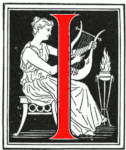
would say one word on the immense intellect which has been devoted to the lifelong practice of art. The names of Leonardo da Vinci, of Milton, and of Goethe, represent men of gigantic stature, who may be selected from the circle of mighty artists, for this particular reason, that possessing enormous power, and showing the ability to pluck fame from almost any occupation, they deliberately made art their, chosen path. Milton, for instance, was a poet—but he was more. He was a statesman—but he was more. He was a great religious thinker and worker — but again he was more. He was one of the most learned men of his time, he was certainly the most accomplished, he was perhaps the most masterly, Latin writer since the classical age had passed away. To state the matter shortly—he was the most complete man to be found in his day. Others were but fractions of men—he alone was an integer. In what other character can we find such an astonishing assemblage of qualities and sympathies, many of them apparently opposite; austerity combined with sensibility, rare tolerance combined in his maturity with dogmatism, learning combined with thought, poetry combined with politics, purity combined with passion, piety combined with the fullest enjoyment of earth ?
The mere union of the poetical temperament i with the active habit is rare; but where in the in whole history of the world shall we find such a poet such a man of action? For among actions, and among the greatest, the most prolific, of all actions, is to be classed that noble speech of his for the liberty of unlicensed printing. It is rare also to find prodigious learning accompanied by large powers of thought. In him, on the contrary, we see a soaring grandeur of idea, which no amount of erudition could drag down. A man so able and so furnished must have been very decided in his own opinions, and he might have despised the opinions of other men; such, however, was the deep sympathy of his nature, that in the midst of intolerance, he was the foremost of all men to insist upon the perfect liberty of thought. And to crown all, though he rejoiced in a strong nature, though he was of the poet’s impulsive complexion, though we find that in everything he undertook he was swept along with a rushing wind of passion, yet such was his self-control, such the exquisite balance of his faculties, that, in practice, excess was unknown to him, and even in hot youth his daily life was a marvel of purity; while in composition, it is amazing to watch the ease with which he can stay his thunder in mid volley, often interposing an elaborate parenthesis between the breathless pauses of some tremendous sentence, which ordinary writers would have been in a fury to finish.
People talk of the myriad-minded Shakespeare, and the many-sided Goethe. No doubt there were many things done by Shakespeare which to Milton would have been impossible. Milton was not many-sided in the sense that he could easily adapt himself to every variety of character, from grave to gay, and from high to low, so that he could give the talk of a tinker not less readily than the chant of a poet, the wail of a widow, and the defiance of a mailed warrior. But he was, on the other hand, many-sided in a sense to which Shakespeare could lay no claim. Shakespeare was only a possible politician, a possible man of action, a chai possible theologian, a possible scholar. Milton -had actually, and to the height of his great soul, a veritable connection, as well as a sympathetic union with the whole life of his time.
As a citizen, as a churchman, as a student, as a man, Shakespeare’s life is almost entirely a blank to us. In all these relations, and not less as a poet, Milton stands out clearly to view; and stands out, if not as the most bustling figure in the scene, yet as the manliest, kingliest, godliest. So that if any one choosing to narrate the history of his day, determined to gather the interest of his story around some central character, and for this purpose were to select the man then living of largest soul, of most varied culture, connected with his age by the greatest number of ties, and more likely than all his contemporaries to live in the estimation of the future—that man must of necessity be John Milton. [II, 151-53]
Bibliography
Dallas, Eneas Sweetland . The Gay Science. 2 vols. London: Chapman and Hall, 1866. A HathiTrust online version of a copy in the Harvard University Library. Web. 30 April 2022.
Created 3 May 2022
ast modified 23 January 2024